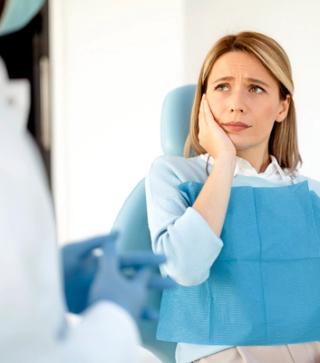Bruxism (teeth grinding)
Bruxism is the habit of grinding or clenching teeth, often unconsciously, that can lead to tooth damage and jaw pain.

Teeth grinding, also known as bruxism, is a common but often overlooked dental issue that can cause significant discomfort. At 818 Dental, we’re here to help those in Armadale manage the pain and prevent further damage with professional, down-to-earth care.
Bruxism is often an involuntary habit, occurring either during sleep (sleep bruxism) or while awake (awake bruxism). Left untreated, it can lead to a range of issues, including jaw pain, headaches, and damage to your teeth.

What are the symptoms of teeth grinding
Teeth grinding can often go unnoticed, especially if it happens while you're sleeping. However, there are some clear signs that indicate you may be experiencing bruxism:
- Sensitive Teeth: An increase in tooth sensitivity or pain can be a result of continuous grinding.
- Loose or Damaged Teeth: Bruxism can loosen teeth or cause cracks, chips, and worn-down enamel.
- Flattened Teeth: Over time, grinding can flatten the biting surfaces of your teeth, making them appear shorter or more even.
- Headaches and Jaw Pain: Frequent headaches, particularly around the temples, and soreness in the jaw or face are common indicators.
- Poor Sleep: Teeth grinding can disrupt your sleep, leading to restlessness or poor sleep quality.
- Cheek Biting: You may also notice signs of biting the inside of your cheeks while grinding.
If you notice any of these symptoms, it’s a good idea to visit our clinic for a check-up and advice on how to manage bruxism.
What are the causes of bruxism
The exact cause of bruxism isn’t always clear, but it’s generally linked to a mix of physical, psychological, and genetic factors. Some of the most common causes include:
Stress and anxiety: Emotional stress, frustration, or anxiety are leading triggers for teeth grinding, especially during sleep.
Genetics: If someone in your family has bruxism, you might be more likely to experience it as well.
Bite misalignment: Issues like an underbite or overbite can lead to grinding as your jaw tries to compensate for the irregular bite.
Medications and conditions: Certain medications (like antidepressants) and neurological conditions such as Parkinson's disease can also contribute to bruxism.
If you suspect you’re grinding your teeth, especially if you wake up with jaw pain or headaches, it’s important to speak with a dentist. Early intervention can help prevent long-term damage to your teeth and jaw.
Treatment for bruxism
At 818 Dental, we offer a range of effective treatment options to relieve pain and protect your teeth from the effects of bruxism. Treatments may include:
- Custom nightguards: Modern 3D scanning techniques allow us to create a device that fits perfectly on your teeth without the use of gooey impressions. The device is made as small as possible and is extremely comfortable to wear.
- Bite adjustments: If your teeth are misaligned, we can recommend solutions to correct your bite and alleviate grinding.
- Stress management: For cases linked to stress or anxiety, we may suggest relaxation techniques or refer you to a professional to help manage the underlying causes of your bruxism.
If muscular hyperactivity continues, we sometimes recommend the use of Botox to reduce this muscular activity.
Is bruxism troubling you?
If this sounds like you then contact our friendly team to schedule an appointment with our 818 dental team.



